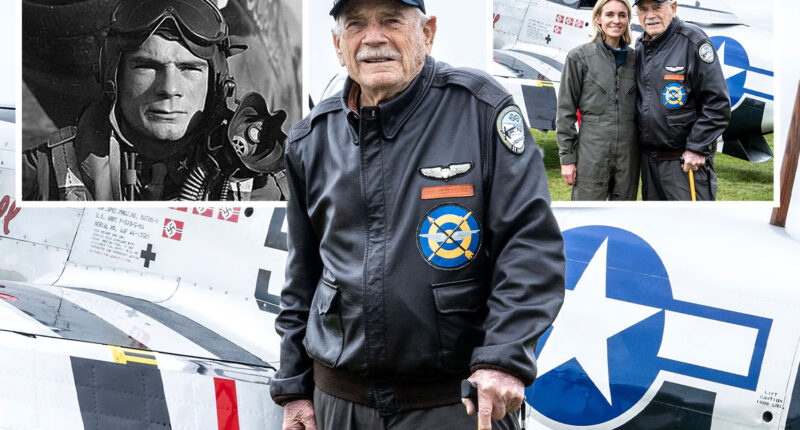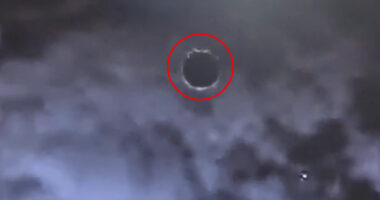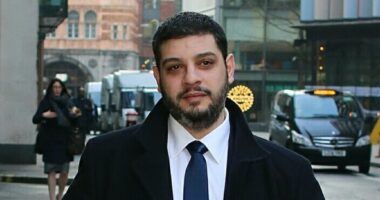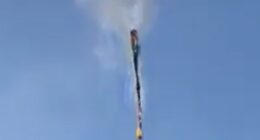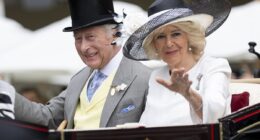FIGHTER pilot Joe Peterburs had to wait 80 years to complete his 50th wartime mission.
In April 1945, Joe attempted his first mission. He departed from an airbase near Cambridge with the goal of safeguarding US bombers on their way to Germany during one of the final air raids of World War Two.


But after a series of dogfights in the skies above Berlin, Joe, then aged 20, was shot down and captured by the Gestapo.
Incredibly, he broke out of a prisoner of war camp and ended up fighting alongside the Russians as they raced to liberate the German capital.
Now aged 100 and hailing from Wisconsin, US, Joe has recounted his remarkable experience in a letter addressed to British schoolchildren. Furthermore, he traveled back to the UK to fulfill his mission, albeit eight decades later.
As one of five surviving World War Two veterans, Joe is participating in VE Mail. This initiative allows students to correspond with a veteran as a way to commemorate the 80th anniversary of the end of the European conflict on May 8, 1945.
Like Joe, the veterans have each written about their life during the war and the lessons they want to pass on to the next generation.
‘You think you’re going to live forever’
This month, on the anniversary of his last flight, a still sprightly Joe climbed into a two-seater version of the P-51 Mustang fighter-bomber he fought in.
He and pilot Isabel Rutland executed a perfect victory roll above the English countryside — an air force tradition at the end of 50 missions.
In a hangar at RAF Duxford, Cambs, Joe exclusively told The Sun: “When you’re young, you’re full of pee and vinegar.
“We all had a fearlessness with being young. You think you’re going to live for ever, but that wasn’t the case for a lot of men I served with.”
Before joining the Army Air Corps in November 1942, Joe had been in the seminary for two years to become a priest.
Based in England, he regularly flew half-day missions with no food or water on board his tiny single-seater fighter bomber.
He recalled: “A typical day, I’d get up about five o’clock, and you eat breakfast, go to the briefing, which is about an hour, and then you get ready to take off.
“You fly a mission that’s five or six hours long, and you get back, and then you’re debriefed, that’s about 45 minutes.
“And in all the time you’re flying, you don’t have any water and you don’t have any food, so you go to the mess hall.
I found a Russian tank convoy and started fighting with them — that could have gone badly
Joe Peterburs
“But first you go to the bar for a drink, and all the pilots get together and we start telling lies about how great we were and then we’d go eat. Then you’d write letters home.”
Joe flew 269 combat hours before being shot down.
He said: “On my last mission, the bombers had about six different targets and it was one big force going into different places in Germany.
“Can you imagine 1,800 bombers and 950 of us P-51 Mustangs?”
Joe’s plane was named Josephine after his sweetheart back home in Wisconsin.
He said: “We became engaged just before I left.


“Her name wasn’t on the nose of the aircraft, it was on the canopy. I put it there because it kept her as close to me as I could get.”
At around 3pm on April 10, 1945, six hours into the mission, Joe dived to attack a German fighter, which had just shot down a fourth US bomber.
The German pilot, Walter Schuck, remembered being attacked from behind by a Mustang that hit his left wing and engine with .50 calibre machine-gun fire.
As Schuck escaped into low cloud, his plane’s left wing burst into flames and the plane went into a death spiral.
The pilot bailed out at 1,500ft. Just 20 minutes later, Joe’s Mustang was shot up and crashed to Earth, after he parachuted out.
Joe said: “When I was shot down, the first thing I thought was my mom’s going to get a telegram.
Guardian angel
“My brother had been killed the year before as a submariner.
“All I could think about was how she would feel.”
While Joe miraculously escaped serious injury when he crashed near Berg, 260 miles from Berlin, he was captured and almost shot before being sent to a prisoner of war camp, which he escaped from.
He said: “I’m convinced that I have our guardian angel on my shoulder. There are too many things where I should not have survived.
“I was going to be hanged by the German civilians who were coming after me but I was saved by a policeman.
“Then the chief of police of the town wanted to blow my brains out with a Luger and I escaped.

“I found a Russian tank convoy and started fighting with them — that could have gone badly. Just outside Wittenberg was the last battle I fought with them.
“When VE Day came, I remember I wasn’t as excited as the Europeans because I knew it meant, as Americans, we were going over to the Pacific to finish the war over there.”
‘We did our duty. The world was in turmoil’
Joe stayed with the Army Air Corps after the war and later fought in Korea and Vietnam.
He has more than 35 medals, including the Legion of Merit, Distinguished Flying Cross, Bronze Star, Purple Heart, and Air Medal with seven Oak Leaf Clusters.
While Joe is moved at being called a hero, he is adamant the heroes were the men he served with.
He said: “I’m not comfortable at all being called a hero because I’m not. Along with all of my buddies we did our job.
You should have something that you care enough about to be willing to die for it
Joe Peterburs
“We did our duty. The world was in turmoil and the heroes are the ones that didn’t make it.
“The rest of us were lucky to survive, but we’re no heroes.
“We did the best we could, and that’s what anybody should do in whatever endeavour they’re undertaking in whatever profession — do the best you can.
“You should have something that you care enough about to be willing to die for it. And when I was growing up, mine was my God, my country and my family.”
Joe retired in 1979 as a colonel, going on to work in finance for the rest of his career.
He said: “If I could go back and do it all again, I absolutely would — but I’d do it better.”
JOE’S STORY
Dearest children,
MY name is Colonel Joe Peterburs and I was a P-51 Mustang American fighter pilot during the Second World War.
I am writing to you as I fly to the UK from the USA, to return to the Kings Cliffe airfield near Peterborough, where I took part in 49 missions from November 1944.
In April 1945, I was taken prisoner after my plane was shot down just outside Berlin in Germany.
I was held as a prisoner of war at Stalag III in Luckenwalde for a week, before escaping and fighting alongside the Russian Red Army until the war’s end.
On VE Day I was in Wittenberg, Germany, having been retrieved by an American army unit just a day or two before.
Though the war outside of Europe wasn’t over, my first thought was that I was going to get home and marry my fiancée, Josephine, who I named my aircraft after.
I had proposed just before I left for the UK and when I returned, we quickly married, before the war felt like it really came to an end with VJ Day in August 1945.
The Second World War took me on a very different path in life. Before the war I had plans of becoming a priest and never marrying.
Joining the air force changed my whole perspective on life and where I thought I needed to be.
I am from a small town in Wisconsin, and so coming to the UK felt like a totally new world.
You don’t have time to think about the external things when you’re at war and I learnt from a young age the importance of concentrating on the task in hand and living life day by day.
My plane coming down close to Berlin was a big moment in my life. I shouldn’t have survived and yet I did. Years later, I became friends with the German who I had shot down just 20 minutes before my own misfortune.
He sprained both legs as he parachuted to the ground and in doing so was unable to fight again, something he believes saved his life.
We met again 60 years later in California, and he became known to my family as Papa Walter.
Some people were confused by our friendship but we knew that, despite being on opposite sides, we had both just been young men, each trying to protect our home.
I believe it is important to be kind as it gives you more than it takes away from you, and in general it makes life a lot happier. I went on to serve for 36 years in the military and finally retired in 1979 at the rank of colonel. When asked what bravery means to me, I would say it’s hard to define.
As long as you’re doing your best, that’s all that matters.
If it ends up being something others would deem brave, fine, but you’ll find most first responders, such as firefighters, don’t feel brave – they are just doing their job.
It’s because of humankind’s kindness and other good traits that we have bravery.
I urge your generation to seek peace and kindness. Life is important and should not be wasted. You have to love one another.
Best wishes, your friend from across the Pond.
Colonel Joe Peterburs
4 MORE HEROES YOUNGSTERS CAN WRITE TO
MERVYN KERSH

TRANSPORT operator Mervyn, now 100, landed in France on D-Day and went all the way through Belgium, Holland and Germany.
In April 1945, Jewish Mervyn became separated from his unit, so he went to Belsen where he befriended survivors of the concentration camp where tens of thousands died.
JEAN GREEN

THE 102-year-old from Norwich joined the Women’s Royal Naval Service aged 19 in 1942.
Living with fellow Wrens in a cabin, she loved the work and became close to colleagues who became lifelong friends.
She served at HMS Raven in Eastleigh, Hants, where her job as “Rum Bosun” was to decide which conscripts got a daily tot of rum.
JOHN ESKDALE

AFTER faking a birth certificate, John joined the Home Guard in Bristol aged 14.
At 17 he joined the Royal Marines and two years later he nearly lost his life when his ship was sunk in the English Channel.
Of 458 crew who went into the sea, only 103 survived. John, now 103, was the last man to be pulled from the water.
TOM JONES

BOMBARDIER Tom, 103, was called up to serve in the Royal Artillery as the war broke out in 1939, when he was 17.
The signaller, from Salford, Gtr Manchester, spent time defending the Liverpool Docks before being posted to Burma – now Myanmar – for four years until the end of the war in 1945.
- More than 800 schools have joined the VE Mail project run by the Together Coalition. Find out more at together.org.uk/ve80
